

How blockchain could make fashion more sustainable. TextileGenesis believes the technology that underpins cryptocurrencies such as bitcoin can help.
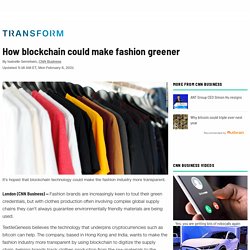
The company, based in Hong Kong and India, wants to make the fashion industry more transparent by using blockchain to digitize the supply chain, helping brands track clothes production from the raw materials to the finished article. Sourcing sustainable materials is becoming a top priority for fashion companies, according to a 2019 report by consulting firm McKinsey & Company. Brands surveyed for the report said they also wanted to create transparency in their supply chains, but McKinsey noted few companies had yet achieved that.
How airbag jeans and high-tech vests could make motorbikes safer. But innovations in airbags could help keep motorcyclists safe.
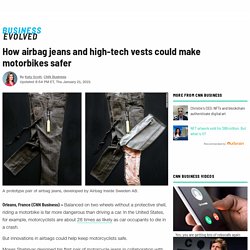
Moses Shahrivar designed his first pair of motorcycle jeans in collaboration with Harley-Davidson Sweden 16 years ago — featuring a protective leather lining. Now he is taking the idea one step further. His company Airbag Inside Sweden AB has designed a prototype pair of super-strong jeans that have concealed airbags inside the legs. The wearer tethers the jeans to their bike and if they fall from the motorcycle, the airbags are triggered, filling with compressed air and lessening the impact on the lower body. The airbag can then be deflated, refilled with gas and reassembled into the jeans to use again, explains Shahrivar. Airbag Inside Sweden AB is in the process of getting the jeans certified to European health and safety standards and is putting them through a series of crash tests.
The company has raised €150,000 ($180,000) from the European Union to develop the idea and is hoping to bring the jeans to market in 2022. BOLID'STER Armored Jeans - Motorcycle Jeans made in France by Pierre-Henry Servajean. Closing the loop july 2017 specialty fabrics review. January 9, 2017 Issue - Vol. 95 Issue 2. [+]Enlarge A close-up of fibers from rinse water shows polyester fleece garments shed up to 2 g of microfibers in the wash.
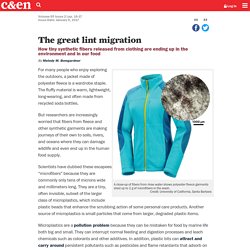
Credit: University of California, Santa Barbara. Fast Fashion Is the Second Dirtiest Industry in the World, Next to Big Oil - EcoWatch. “The clothing industry is the second largest polluter in the world ... second only to oil,” the recipient of an environmental award told a stunned Manhattan audience earlier this year.
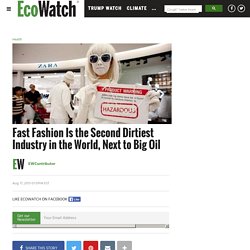
“It’s a really nasty business ... it’s a mess.” Is Ethical Fashion Just This Year’s Model? DFD - Textiles. DFD Le dégraissage industriel de textiles professionnels : vêtements de travail, chiffonnettes d’essuyages… Le nettoyage au CO2 supercritique convient pour les textiles aux salissures grasses, en remplacement des perchloréthylènes. - Des essais sont en cours avec des usines industrielles du secteur.

Contactez-nous pour réaliser vos propres essais. L'utilisation du CO2 supercritique permet de traiter le textile de manière plus hygiénique et saine, il permet aussi de neutraliser certaines odeurs imprégnées. Sa neutralité par rapport aux tissus permet de ne pas les oxyder et ni les agresser pour des actions de nettoyage. La technologie de DFD peut aussi être utilisée pour le tannage des cuirs Le tannage au CO2 supercritique permet de traiter des peaux pour les transformer en cuir, matériau souple et stable dans le temps qui devient utilisable dans différents domaines comme l'habillement, les revêtements d'ameublement, la maroquinerie, la sellerie... Avenir de l'industrie textile; entretien avec Christine Browaeys. Nous parlons souvent du point de vue des créateurs sur les textiles innovants mais rarement de celui des ingénieurs et des industriels.
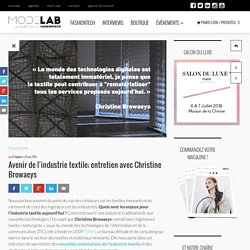
Quels sont les enjeux pour l’industrie textile aujourd’hui ? Comment ouvrir une industrie traditionnelle aux nouvelles technologies ? Un sujet que Christine Browaeys connaît bien. Introduces OmniaScreen. Verosol launches new versatile metallised screen fabric: OmniaScreen.

A 2x2 basketweave pvc polyester metallised screen fabric for indoor solar shading with up to 74% reflection . Our OmniaScreen has been developed to complement the range of high-performance metallised screens. With this 2x2 clear basket weave and its robust feel, it offers the answer in an increasingly competitive market where the demand for a good balance between price and performance is evident. A versatile easy accessible screen for any purpose, hence the name Omnia.
With it's tremendous energy savings capability on cooling, lighting and heating this product offers more than just good value. Picture Organic Clothing, la marque qui agite le marché des sports de glisse. Paywall mobile. Outdoor jacket made of sugar – and yet still wind-resistant. Sustainability is the big trend in the clothing industry.
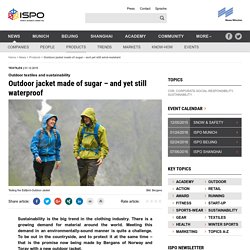
There is a growing demand for material around the world. Meeting this demand in an environmentally-sound manner is quite a challenge. To be out in the countryside, and to protect it at the same time – that is the promise now being made by Bergans of Norway and Toray with a new outdoor jacket. The new version of the ‘Eidfjord Jacket’ is set to be a milestone in outdoor clothing.
Designed for nature lovers, it is also kind to the environment. Ecodear – a mini revolution Toray uses molasses, a by-product of sugar manufacture, to obtain ‘ecodear’. The substance ‘ecodear’ has been in existence since 2013. Textile manufacturer Toray has set itself an even more ambitious goal: they want to promote sustainable development and, within the space of just a few years, to produce jacket material out of 100 per cent resource-conserving raw materials – and thus, perhaps, to influence the environmental policies of other manufacturers. Quel est l'impact de l'industrie textile sur l'environnement ?